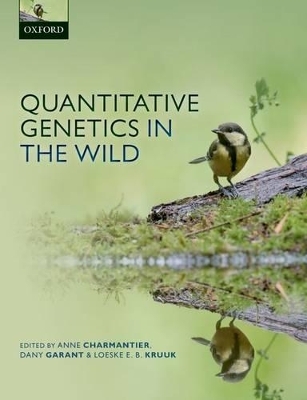
Quantitative Genetics in the Wild
Oxford University Press (Verlag)
978-0-19-967424-4 (ISBN)
Although the field of quantitative genetics - the study of the genetic basis of variation in quantitative characteristics such as body size, or reproductive success - is almost 100 years old, its application to the study of evolutionary processes in wild populations has expanded greatly over the last few decades. During this time, the use of 'wild quantitative genetics' has provided insights into a range of important questions in evolutionary ecology, ranging from studies conducting research in well-established fields such as life-history theory, behavioural ecology and sexual selection, to others addressing relatively new issues such as populations' responses to climate change or the process of senescence in natural environments. Across these fields, there is increasing appreciation of the need to quantify the genetic - rather than just the phenotypic - basis and diversity of key traits, the genetic basis of the associations between traits, and the interaction between these genetic effects and the environment. This research activity has been fuelled by methodological advances in both molecular genetics and statistics, as well as by exciting results emerging from laboratory studies of evolutionary quantitative genetics, and the increasing availability of suitable long-term datasets collected in natural populations, especially in animals.
Quantitative Genetics in the Wild is the first book to synthesize the current level of knowledge in this exciting and rapidly-expanding area. This comprehensive volume also offers exciting perspectives for future studies in emerging areas, including the application of quantitative genetics to plants or arthropods, unraveling the molecular basis of variation in quantitative traits, or estimating non-additive genetic variance. Since this book deals with many fundamental questions in evolutionary ecology, it should be of interest to graduate, post-graduate students, and academics from a wide array of fields such as animal behaviour, ecology, evolution, and genetics.
Dr Anne Charmantier is an evolutionary ecologist working for the CNRS in Montpellier, France. Her research interests are centered on understanding the evolutionary mechanisms underlying variation in life-history and behavioural traits in natural populations. She particularly focuses on the role of environmental degradation; this degradation can be internal (i.e. senescence); or external (changes in the environment, including those induced by man). During her PhD in behavioural ecology in Montpellier, she discovered quantitative genetics while working with Loeske Kruuk in Edinburgh. She then spent three years as a postdoc in the University of Oxford before taking up a CNRS position in Montpellier to study evolutionary processes in bird populations. In 2011, she received the CNRS Bronze Medal. She is associate editor of the journals Evolution and Proceedings of the Royal Society B and currently holds an ERC Starting Grant. Dr Dany Garant is Professor of Biology at the Université de Sherbrooke, Canada. His research program is focussed on understanding the factors shaping the adaptive potential of wild animal populations that face changing environmental conditions by assessing both their evolutionary potentials and their phenotypic plasticity. After completing his PhD at Université Laval, where he worked on the molecular ecology of salmonids, he moved to Oxford University where he was a NSERC postdoctoral researcher, working on evolutionary quantitative genetics of birds. After this postdoc he was hired by the Université de Sherbrooke where he established a research group working on these areas of research. He has published several articles in the field of quantitative genetics in the wild and he currently serves as an associate editor for Molecular Ecology. Dr Loeske E. B. Kruuk is Professor of Evolutionary Ecology at the University of Edinburgh, UK. Her research interests are focused on how evolutionary and ecological processes shape biological diversity in wild animal populations. After an undergraduate degree in mathematics, she realized that biology was more interesting and so did a PhD in population genetics at the University of Edinburgh. Her interest in quantitative genetics began during a postdoctoral position at the University of Cambridge, after which she returned to Edinburgh on a Royal Society University Research Fellowship. She has been involved with many long-term studies of wild animal populations, but with a bias towards Scottish ungulates and, more recently, Australian passerines: these have allowed her to investigate a range of issues such as quantitative genetics, the effects of climate change, senescence, phenotypic plasticity, natural and sexual selection, inbreeding depression and maternal effects.
1. Introduction ; 2. Four decades of estimating heritabilities in wild vertebrate populations ; 3. Quantitative Genetic Approaches to Understanding Sexual Selection and Mating System Evolution in the Wild ; 4. Individual behaviour: behavioural ecology meets quantitative genetics ; 5. The quantitative genetics of senescence in wild animals ; 6. The effects of others' genes: maternal and other indirect genetic effects ; 7. Dominance genetic variance and inbreeding in natural populations ; 8. Cross-pollination of plants and animals: wild quantitative genetics and plant evolutionary genetics ; 9. Quantitative genetics of wild populations of arthropods ; 10. Case study: quantitative genetics and sexual selection of weaponry in a wild ungulate ; 11. Epigenetic processes and genetic architecture in character origination and evolution ; 12. Evolutionary potential and constraints in wild populations ; 13. Molecular quantitative genetics ; 14. Bayesian approaches to the quantitative genetic analysis of natural populations ; 15. Evolutionary dynamics in response to climate change
| Verlagsort | Oxford |
|---|---|
| Sprache | englisch |
| Maße | 191 x 246 mm |
| Gewicht | 664 g |
| Themenwelt | Naturwissenschaften ► Biologie ► Evolution |
| Naturwissenschaften ► Biologie ► Genetik / Molekularbiologie | |
| Naturwissenschaften ► Biologie ► Zoologie | |
| ISBN-10 | 0-19-967424-8 / 0199674248 |
| ISBN-13 | 978-0-19-967424-4 / 9780199674244 |
| Zustand | Neuware |
| Haben Sie eine Frage zum Produkt? |
aus dem Bereich


